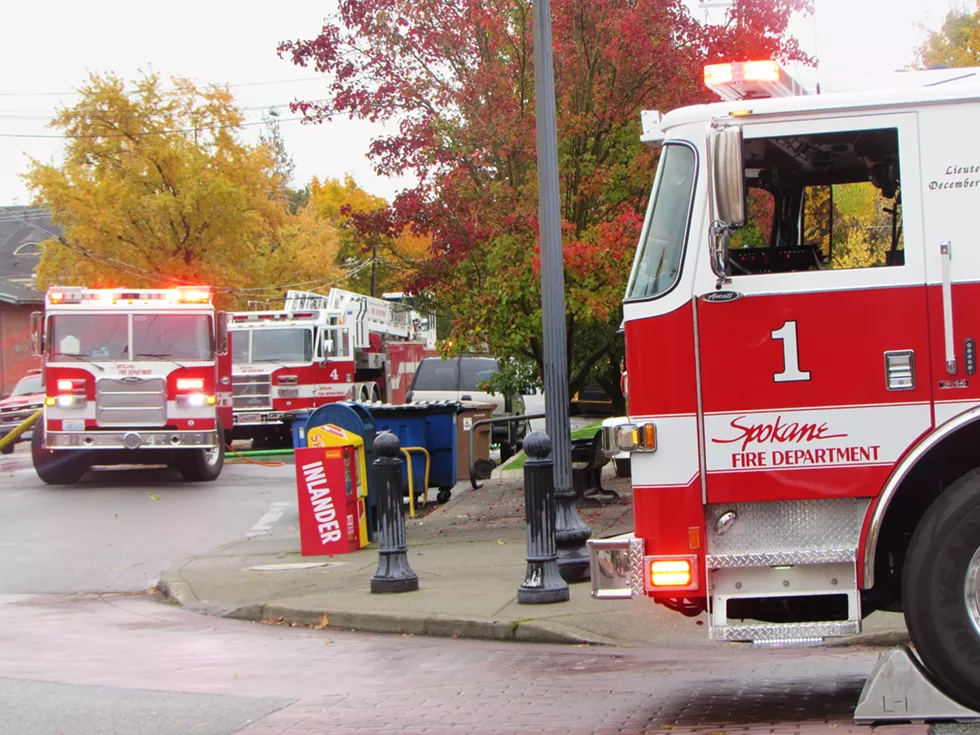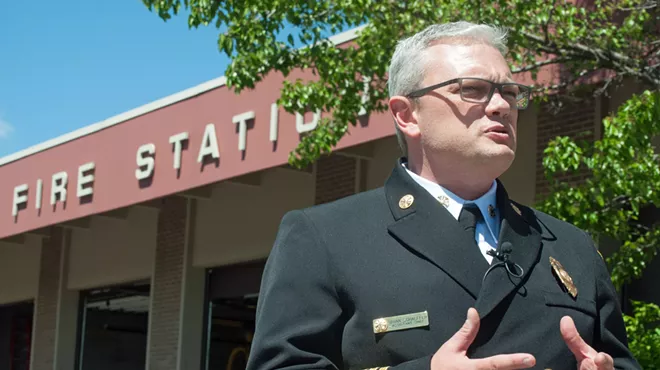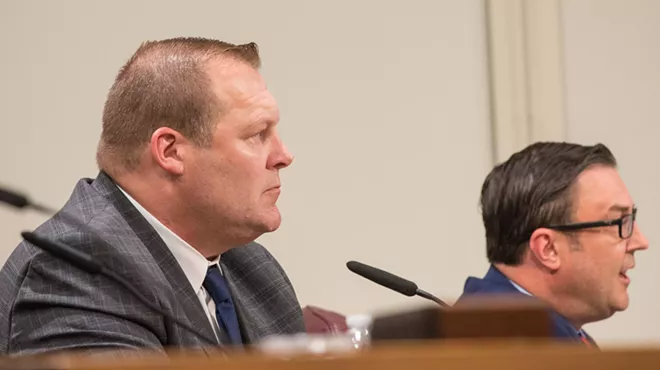
Spokane Fire Department Lt. Brandon Bacon's base salary of more than $102,000 is already pretty good. It's almost twice the median household income in the city.
But that's not nearly as lucrative as what, in one sense, could be considered his second job: Working overtime for the city.
Bacon, a 10-year veteran of the department, made $119,000 in overtime last year, racking up more than $221,000 in take-home pay. That's better than about 95 percent of the households in Spokane County.
It's more than Mayor Nadine Woodward made last year.
It's more than Gov. Jay Inslee made last year.
It's even more than Brandon Bacon's dad made last year.
Bacon's father — fire battalion chief and a longtime fire-union icon Michael Bacon — makes a base salary of $155,000 and racked up more than 500 hours in overtime. But Brandon Bacon worked three-and-half times more overtime than that. So he still beat his father's total by nearly $10,000.
And yet, Brandon Bacon wasn't just some wild outlier: His firefighter colleague, Lt. Jason Archibald, managed to tally up $110,000 in overtime in 2021. Capt. Kevin Haughton racked up over $100,000. So did Kelly Thomas, a shift supervisor working in the city's fire dispatch center. And even though Battalion Chief David Heizer resigned in mid-October due to the city's enforcement of the state vaccine, he still got more than $55,000 in overtime pay last year.
And every single one of them — Thomas, Archibald, Haughton, Heizer, and both Bacons — made over $200,000 last year. In 2021, skyrocketing overtime boosted at least 12 city employees over the $200,000 mark, and every single one of them was a firefighter or fire dispatcher.
Of the top 50 employees who got paid the most in overtime last year, nine were cops, and 41 were firefighters or dispatchers, according to a records request obtained last month by the Inlander.
As we wait for Matrix Consulting to finish their independent study on the city's overtime usage, we plotted the last three years of top City of Spokane overtime recipients in this interactive graph, illustrating just how much of the overtime load the top employees are carrying — and the fortune they're making as a result.
"These guys are heroes, not because of the work they do, but because of the sacrifices they're making," Marler says. "Yeah, it’s a ton of hours, but it’s a ton of hours. It’s not like they’re making all this easy money. They’re spending tons of time at work away from their families."
Take Brandon Bacon for example.
"Brandon Bacon worked his tail off managing and setting up all of our contact-tracing during COVID... setting up testing and running around the clock, 24/7," Marler says.
Last year, he logged over 1,850 hours of overtime. If he worked every single week of the year — no vacation — that's an average of more than 35 additional hours a week, every week. And that's on top of the little more than 46 hours of regular work he has to do a week that isn't considered overtime. Put those together, and Bacon is working more than 81 hours a week many weeks, even longer if he takes his full vacation time.
"The amount of hours for some of these people is so large that I am concerned about how this might affect their overall well-being," Council President Breean Beggs wrote in an email to the Inlander.
Generally, overtime is voluntarily doled out in the department, though last year there was so much need for overtime that some employees were forced to work overtime.
As for how it affects the taxpayer? That's a little trickier. First, some of the overtime, such as for work fighting wildfires, gets reimbursed eventually. Second, it's actually good to have a little bit of overtime. The demand for overtime is much higher in the summer months. You don't want to hire enough firefighters to avoid overtime in July, only to have dozens of them left twiddling their thumbs in January.
Even though firefighters working overtime get paid one-and-a-half times their typical hourly salary, at lower levels of overtime, if the city hires another employee, they have to pay for that employee's benefits, too, not to mention extra training. Sometimes, it's more financially sensible to cut a bigger check for the employees you have than it is to find additional ones.
Last year, the fire department spent roughly $9 million in overtime, according to preliminary city data. That's more than it spent on overtime every year from 1999 to 2010 combined. The fire department paid out 33 percent more over time just in the month of July than it had for the entirety of 2009.
$9 million in overtime is enough money, theoretically, to pay the base salaries and benefits for nearly 69 Brandon Bacons. After all, in 2016, the city got a $9 million grant it used to pay for over 40 new firefighters for at least two years. In 2019, voters passed a $5 million levy to pay for 30 firefighters and 20 police officers a year — imagine what $4 million more than that could have paid for.
1. COVID
This is the obvious one: COVID sent medical call volume soaring. COVID resulted in firefighters holding vaccine clinics. COVID resulted in repeated cycles of firefighters out on quarantine or with illness. COVID resulted in the cancellation of 2020's fire department academy that would have brought on much-needed new firefighters.
And finally, COVID resulted in Washington state's vaccine mandates for health care providers, including firefighters. Some firefighters chose to quit rather than be vaccinated. Other fire departments in the county took more risks — finding "accommodations" for their unvaccinated firefighters and choosing to train more firefighters.
"The City of Spokane has been ultra-cautious about our handling of the pandemic," Marler says. "It's hard to argue with safety."
Ironically, the Spokane Police Department's overtime during COVID remained relatively flat. While high-profile protests drew a lot of police overtime, SPD spokeswoman Julie Humphreys says, that was balanced out by the cancellation of major community events like Hoopfest and Bloomsday, frequent culprits when it comes to major police overtime usage.
2. Wildfires
2021 was one of the worst wildfire seasons in history. Nearly $1.2 million of last year's overtime total came from fighting wildfires last year. That's one reason why Lt. Archibald and many other of the firefighters who got the most overtime are on the list. The good news is that state and federal money will reimburse that over time — it just takes a long time to get reimbursed.
3. The big combined-dispatch-center mess
You could blame the Spokane City Council for refusing to move their fire-dispatch system to the region-wide Spokane Regional Emergency Communications Center. Or you could blame former Mayor David Condon for firing a number of dispatchers and delaying hiring any replacements. Either way, the power struggle had a real consequence: understaffing the city's dispatch center. That meant shift supervisors like Kelly Thomas began turning in tremendous amounts of overtime.
Battalion chiefs are some of the most well-paid employees in the department. So it made sense that the city would want to encourage expensive veteran employees to retire early, making room for their younger replacements. But without replacements ready, the city has repeatedly found itself paying the remaining battalion chiefs huge amounts of overtime.
5. The city has tied its own hands
Contractually, the Spokane Fire Department needs to have two battalion chiefs on hand at all times. And contractually, lower-level firefighters can't fill in if Battalion Chiefs are sick. By city council ordinance, all the smaller and nimbler "alternative response vehicles" still have to be manned by at least two firefighters, despite being piloted as single-man units. Other units need to be manned by at least three firefighters.
There are cases to be made for all these decisions, but rules like these mean the department often needs to run on more employees than they have available at any given time. Contractually, the department doesn't have a choice but to use overtime.
6. The department got bigger — but the overtime problem got worse
If you have a huge amount of overtime, it's usually a sign that you're understaffed. Yet when Spokane got their "SAFER" grant to hire 48 more firefighters, overtime didn't fall. That's because the city expanded its amount of services around the same time. They had more employees, yes, but the workload just increased to compensate.
Adding new fire stations, like the temporary fire station dedicated to serving the wildfire-vulnerable Eagle Ridge development, just made the problem worse — creating new places that had to be fully staffed.
7. The department hasn't resurrected their relief pool
Why was overtime so comparably low back in the early 2000s? Simple. The department had a "relief pool" of firefighters who would move around to fill vacant spots when vacations or illnesses cropped up. But as overtime keeps growing, that relief pool hasn't been re-established.
8. City leadership failed to plan ahead
When Brian Schaeffer became fire chief in 2017 — the Inlander called overtime one of the biggest challenges he would face. That turned out to be more accurate than many of us may have imagined.
"It was a running joke in the department," says retired firefighter Shawn Poole, who ran for mayor. "If you're hired under Brian Schaeffer, you're going to make millions, because you're going to get as much overtime as you can."
Poole retired in October, but still made more than $51,500 in overtime in 2021 before he left.
Marler, however, intensely disputes Poole's claim that Schaeffer's management of overtime was a "running joke."
"I have asked around and had many more people approach me about that quote," he writes in an email. "No one has ever heard that, said that, or thinks that."
Battalion Chief Childears also says Poole's line isn't accurate, but is still highly critical of Schaeffer.
"There is more overtime now than at any previous time in my 28 years, but it’s not a premeditated plan to ensure you can work all the overtime you want," Childears writes in an email. "It’s poor forecasting of organizational needs and lack of proper budgeting."
He cites Schaeffer's failure to create a relief pool as an example.
Another issue: Though overtime remained high in 2019, the department didn't launch a fire academy to recruit more firefighters for their understaffed department, even after the levy passed in February of that year. Marler says the department had to wait until the tax revenue actually came in before using it to hire more employees.
But whether Schaeffer, former Mayor David Condon or other city leaders are to blame, the department still spent $3.5 million in overtime that year, money that could have hired dozens of first-year firefighters. The city also had reserves it could have spent, and the delay has cost it much, much more.
While the city plans to bring on more firefighters this year, right now, some of that levy money — reserved for hiring employees — is still sitting unused in the bank.
9. The fire department staff is too old/too young
Back in 2017, Schaeffer told the Inlander part of the overtime issue was related to the old age of the department.
"We have a lot of long-term injuries and illnesses. That has an impact on overtime," Schaeffer says. "We have people with job-related cancer that aren't able to come to work, and people with knee surgeries."
Last year, Schaeffer told us part of the overtime issue was related to the young age of the department.
"So we have a lot of long-term injuries from soccer and semi-pro sports, bicycle accidents, you name it, things we wouldn't have necessarily have seen with an older workforce," Schaeffer says. "That has definitely added to some of the challenges with us maintaining staffing."
10. Potential sick-leave shenanigans
"There are certainly areas in our schedules where vacation, sick time, and frequency of vacation/sick time and frequency of the vacation/sick time and overtime is suspicious," Schaeffer told the Inlander in December.
While Marler has told the Inlander he hasn't heard anything about any kind of protest or any other kinds of sick-time shenanigans, there was a huge spike in sick-time leading up to the vaccine mandate. That could be simply a result of the Delta wave getting firefighters — or their kids or spouses — sick. But the Woodward administration is currently conducting an audit to find out for sure.
*The story has been corrected to remove an inaccurate statement about pensions. While a firefighter's pension can be inflated significantly by working large amounts of overtime, the ongoing obligation is paid through the state, not the city.



















